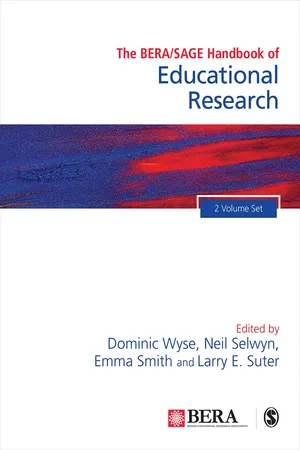
The BERA/SAGE Handbook of Educational Research
- 1,170 pages
- English
- ePUB (mobile friendly)
- Available on iOS & Android
The BERA/SAGE Handbook of Educational Research
About This Book
Education has continued to grow in stature and significance as an academic discipline. In addition to world renowned research studies the growth of education has been seen in the methodology and methods underpinning its research. The BERA/SAGE Handbook of Educational Research provides a cutting edge account of the research and methodology that is creating new understandings for education research, policy and practice. Over two volumes, the handbook addresses educational research in six essential components: Section 1: Understanding Research Section 2: Planning Research Section 3: Approaches to Research Section 4: Acquiring Data Section 5: Analysing Data Section 6: Reporting, Disseminating and Evaluating Research Featuring contributions from more than 50 of the biggest names in the international field, The BERA/SAGE Handbook of Educational Research represents a very significant contribution to the development of education.
Frequently asked questions
Information
Part I Understanding Research
1 Reasons for Education Research
The word ‘research’ as here used does not describe any specific method or procedure. It designates a point of view – an attitude of enquiry and of willingness to test any theory against the evidence of the most carefully scrutinised and representative body of available facts. It implies a readiness to give up preconceived notions and to seek guidance not only from traditional interpretations but also from direct observation and experiment in any field of study. When successful, such research adds to the sum of human knowledge, and wise use of its findings leads to the husbanding of resources and the discovery of more satisfactory ways of living. (Fleming, 1952, p. v)
Introduction
Why undertake educational research?
Table of contents
- Cover
- Half Title
- Editorial board
- Title Page
- Copyright Page
- Contents
- Illustration List
- Illustration List
- Illustration List
- Notes on the Editors and Contributors
- Preface
- Editors’ Introduction
- Part I Understanding Research
- 1 Reasons for Education Research
- 2 The Role of Theory in Research
- 3 The Ethics of Research
- 4 Shared Principles of Causal Inference in Qualitative and Quantitative Research
- 5 The Validity and Reliability of Research: A Realist Perspective
- Part II Planning Research
- 6 Approaches to Reviewing Research in Education
- 7 Purposes for Educational Research
- 8 Research Questions in Education Research
- 9 An Introduction to the Importance of Research Design
- 10 A Positivist Orientation: Hypothesis Testing and the ‘Scientific Method'
- 11 Interpretivism as a Theory of Knowledge
- 12 Unpacking Pragmatism for Mixed Methods Research
- 13 Sampling Decisions in Educational Research
- Part III Approaches to Research
- 14 Historical Research
- 15 Using International Comparative Studies in Achievement
- 16 Ethnography
- 17 Grounded Theory
- 18 Case Study Research
- 19 Surveys: Longitudinal, Cross-sectional and Trend Studies
- 20 ‘True’ Experimental Designs
- 21 Educational Action Research as Transformative Practice
- 22 Systematic Review and Meta-Analysis
- 23 Mixed Methods Approaches and their Application in Educational Research
- 24 Using Secondary Data Analysis
- 25 Researching in Digital Environments
- Part IV Acquiring Data
- 26 Access, Sites and Settings
- 27 Observing and Recording Classroom Processes
- 28 Personal Experience Methods in Practitioner Research
- 29 Multimodality, Meaning, and Data Analysis
- 30 Research Interviews1
- 31 Surveys and Questionnaires
- 32 Measurement
- Part V Analysing Data
- 33 Cataloguing and Organizing Data
- 34 The Role of Theory in Quantitative Data Analysis
- 35 Descriptive Statistics
- 36 Inferential Statistics
- 37 How Should Numeric Data be Analysed?
- 38 Coding and Analyzing Qualitative Data
- 39 Conversation Analysis
- 40 Discourse Analysis/Critical Discourse Analysis
- 41 Content Analysis
- 42 Confirmatory Factor Analysis
- 43 Logistic Regression
- 44 Multilevel Modelling for Educational Data
- 45 Big Data and Educational Research
- Part VI Reporting, Disseminating & Evaluating Research
- 46 Generalizability
- 47 Writing about Research
- 48 Communicating Research Findings
- 49 Social Media and Academic Publishing
- 50 Evaluation of and Accountability for Individual and Institutional Research on Education
- 51 Using Research Findings
- Index